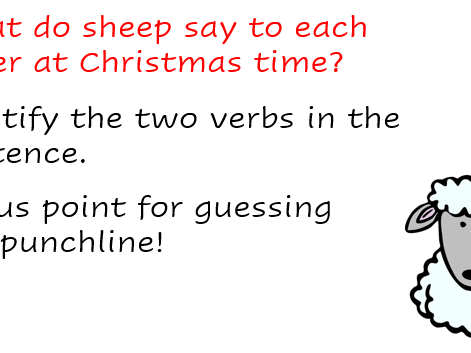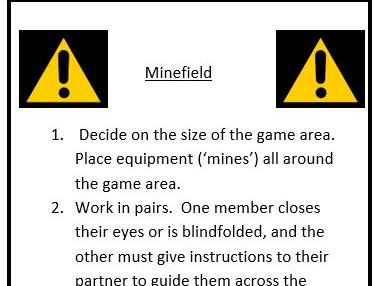75Uploads
17k+Views
1k+Downloads
English

Greater Depth Writing Knowledge Organiser
This is a two-paged knowledge organiser to help children reach the Greater Depth writing standard. Page one explains and gives examples of the expected punctuation. It also provides examples of formal writing and how to manage shifts in formality. Page two, contains all of the spellings from the 5/6 spelling list. Aimed at Y6.

Verb tenses and parts of a sentence knowledge organiser
A two-page knowledge organiser. The first page covers the main tenses covered in KS2. The second page explains different parts of a sentence: main clause, relative clause, prepositional phrase, noun phrase and fronted adverbials.

Vocabulary Games and Activities
Four different games to improve vocabulary. Instructions and categories for Scategories, instructions for Call My Bluff, and instructions and a full set of question cards for grammar vocabulary Jeopardy and maths vocabulary Jeopardy. The games can be played as a whole class but the instructions are written to be understood and played independently by small groups of UKS2 children or lower if certain vocabulary is removed from the Jeopardy games.

Guided reading questions How the Whale Became by Ted Hughes
Guided / group reading questions about three of the stories in How the Whale Became and Other Stories: How the Whale Became, How the Elephant Became and How the Bee Became. Each sheet of questions contains vocabulary questions, fact retrieval questions and inference questions. Answers included. These are questions about the text, not the text itself.

SPAG 'only connect' style walls
Five ‘only connect’ style walls. Each contains four groups of four words that are linked by word class or meeting. Suitable for a lesson starter, extension activity or plenary. Answers included. Good for group or partner discussion.

Writing knowledge organisers
Knowledge organisers for newspaper reports, diary writing, biographies, playscripts, adverts and letters. There are two guides per sheet of A4.

Writing knowledge organisers
Writing guides for different genre of non-fiction writing: non-chronological reports, recounts, discussion, persuasion, instructions and arguments. They have a checklist of features, a writing skeleton and examples of vocabulary that would be useful to the particular text type. Can be used for display or can be printed as knowledge organisers to help children write in foundation subjects.

Summer SPAG Quiz
Aimed at Year Five/Six, this SPAG quiz is designed to be used as a fun end of term activity, either in teams, individually or as part of home learning. There are ten questions (plus answers), covering aspects of the Year Five / Six curriculum.

Home learning English planning - holiday adverts
This is a two week block of planning on persuasive writing which looks at holiday adverts. It was designed to be used by children at home during lockdown, but would be also appropriate as an end of term block in school. It was created with a mixed age class of year 4/5/6 in mind, but could be easily adapted. There are a couple of links to BBC bitesize clips, but children without access to this can still use the plans. The example text of a holiday advert is included, and no other resources are needed.

Discussion (planning plus core texts)
This a two week block of English work on discussion texts. It was originally planned for delivery as home learning during lockdown, but can be used at other times as well. The aim was to keep it simple enough to be completed at home without specialist adult support. It was designed for a Year Four/Five/Six class, but can be easily adapted for only one of these year groups. There are two core texts included so no additional resources need to be found or prepared.
Bundle

Christmas quizzes - grammar and maths
Two end of term fun quizzes aimed at year five and six, but suitable for slightly older too. The grammar quiz looks at spelling (from the five/six spelling list), punctuation and word classes. The ten questions are all Christmassy themed with illustrations and Christmas jokes. The maths one is aimed at the same ages and has 10 Christmas-themed questions covering word problems, area, shape etc. Ideal for the end of term. Can be completed in teams or individually.

Christmas Grammar Quiz
A ten-question quiz aimed at year five/six. The questions assess apostrophe use, spellings from the five/six spelling list and word classes. The quiz contains Christmassy images and jokes. Ideal for the last week of term.

Grammar vocab : a game to teach grammar vocab from the National Curriculum
A card game that can be played in small groups or as a whole class. Teams choose to answer a 10, 20 or 30 point question. They are read a definition and have to guess the correct grammatical term. The more points the question is worth, the harder the question. Ideal for plenaries, lesson starters and independent group work. Print and laminate the cards to keep.
Bundle

SEN resources
Four essential SEN resources. An IEP format that allows for tracking of targets across a year; a resource sheet for learning spellings that is particularly suited to students with dyslexia; a word wall to practice learning key vocab and a sheet to practice key phonics.

Dicey spellings: activity sheet to learn spellings.
For use by all pupils including SEN. Choose a word to learn (depending on the child you can use the common exception words list for Year Two or the 3/4 or 5/6 spelling lists). Roll the dice to determine what to do with the target word. The multi-sensory approach is particularly good for dyslexic students. Designed to be used as an independent activity.

Persuasive writing (adverts) - core text and planning
A two week series of lesson ideas plus the core text needed. This is a simple unit of work, with an easy-to-remember core text which includes examples of many of the features in ‘expected’ year six writing. The simple core text allows less able writers to easily imitate independently at the end of the unit.

Writing Editing Bingo Card
Can be double-sided and laminated to be used throughout the school year. This is a two page guide to show children what we are looking for when we assess their writing at the end of Key Stage Two. It explains and gives examples of each feature. Can be used for children to assess their own writing as they go (points for a line, full house etc) or for peer to peer assessment. Good way of getting children to look back at their writing for features that are considered ‘expected’ in Year Six.

Team building games
Six team building games. Good for PSHE lessons, instruction writing and the beginning and end of term. Includes ideas for extension. They are designed to be read by children as well as adults.


















